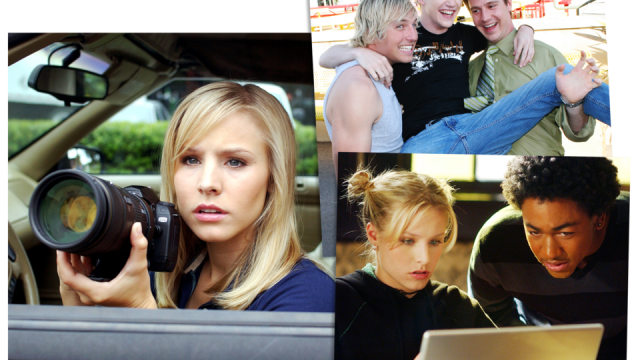Greetings, dearies! Here is what I have this week…
On the 7th, Marc Freeman of Vanity Fair presented an oral history of Veronica Mars:
“Though the show that bears her name aired for only three years on UPN (from 2004–2007), Veronica cast a long shadow. The show was adored by critics who appreciated its daring twists on hoary teen-drama tropes, regularly including it on their must-watch and best-of lists. It launched the careers of several future stars, including Bell, Amanda Seyfried, Tessa Thompson, and Ryan Hansen. And while its ratings may have been modest, Veronica also won the rabid devotion of a cult fandom—the self-proclaimed ‘Marshmallows’ who have helped Veronica Mars live on long after its premature cancellation. They’re the reason Thomas and Bell have been able to bring Veronica back twice—first in 2014, after a 2013 Kickstarter campaign to fund a follow-up movie that blew past its $2 million goal in less than one day. (It ultimately raised nearly three times that much.) On July 26, Veronica will return to the small screen once more, this time in an eight-episode revival series set to premiere on Hulu July 26.”
Dani Di Placido talked about how David Letterman brought out to real Kanye West, for Forbes, on the 10th:
“Talented musician, fashion designer, artist and entrepreneur, West came across as someone deeply uncomfortable under scrutiny, appearing to find even the gentle questioning of Letterman intrusive. The heights of West’s ambition and talents seem to contrast with his personality; ironically, for all his attention-absorbing antics, West doesn’t seem particularly well-suited to fame.”
Steven Ovadia argued that we need to do away with music charts for Consequence of Sound, also on the 10th:
“Music charts used to be simple things. (And they sure as hell didn’t get sued by pissed-off DJs.) People either bought a single/album, or they listened to it on the radio. Now, as Rolling Stone has learned, it’s gotten more complicated. There’s streaming. There are online radio stations. There are podcasts. And while there are rules and laws that govern the use of music, including who collects the royalties, there are so many podcasts and streams that it’s impossible to police. And that means usage metrics are hard to track. There’s also the issue of bots and how much streamed music is heard by an actual human and how much someone is gaming the system.”
On the 11th, Jody Rosen shared the story of a secret fire at Universal Studios for The New York Times
“The fire that swept across the backlot of Universal Studios Hollywood on Sunday, June 1, 2008, began early that morning, in New England. At 4:43 a.m., a security guard at the movie studio and theme park saw flames rising from a rooftop on the set known as New England Street, a stretch of quaint Colonial-style buildings where small-town scenes were filmed for motion pictures and television shows. That night, maintenance workers had repaired the roof of a building on the set, using blowtorches to heat asphalt shingles. They finished the job at 3 a.m. and, following protocol, kept watch over the site for another hour to ensure that the shingles had cooled. But the roof remained hot, and some 40 minutes after the workers left, one of the hot spots flared up.”
Ryan Menezes discussed things the government demanded be changed in the films over at Cracked on the 12th:
“When a Hollywood film features a bunch of tanks or aircraft carriers or tankcraft carriers (best of both worlds), they probably got that stuff thanks to the U.S. Department of Defense. But in order to get access to those cool toys, movies have to hand some measure of influence over to the DOD. A couple of investigators had the DOD produce documents listing all the films they’ve ever supported, and sometimes their demands have gone a lot further than ‘Make sure we look super badass.'”
Enjoy!

